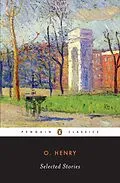Eighty short stories by a master of the genre
O. Henry's comic eye and unique, ironic approach to life's realities are unmatched. These stories-about con men and tricksters and "innocent" deceivers, about fate, luck, and coincidence-have delighted generations of readers. Set in New York and the West, in Central America and the South, they demonstrate O. Henry's mastery of speech and place, and highlight his appreciation of life's quirks.
For more than seventy years, Penguin has been the leading publisher of classic literature in the English-speaking world. With more than 1,700 titles, Penguin Classics represents a global bookshelf of the best works throughout history and across genres and disciplines. Readers trust the series to provide authoritative texts enhanced by introductions and notes by distinguished scholars and contemporary authors, as well as up-to-date translations by award-winning translators.
Autorentext
William Sydney Porter (1862-1910) published all of his work-a novel and some 300 short stories-under the pseudonym 0. Henry. His talent for vivid caricature, local tone, narrative agility, and compassion tempered by irony made him a vastly popular writer in the last decade of his life. He was born in Greensboro, North Carolina, to ordinary middle-class parents and worked in an uncle's drugstore as a youth, becoming a certified pharmacist. Like many Southerners after the Civil War, he sought his fortune in the West, holding various jobs (newspaper work, clerking in a land office, a teller at an Austin bank). Charged with embezzlement in 1894, he fled to Honduras, returning in 1897 to be with his ill and dying wife. His conviction was caused more by his eluding trial than by the conflicting evidence of theft. In the Ohio State Penitentiary (1898-1901), he began to write the stories that made him famous. He moved to New York, remarried, and kept his identity a secret from all but a few friends. He is buried in Asheville, North Carolina. He is universally honored for his mastery of the short story and for his humane spirit.
Guy Davenport, a critic and writer of fiction, is best known for two books of essays, The Geography of the Imagination and Every Force Evolves a Form. He has published seven collections of short stories and numerous translations of early Greek poets and playwrights. Now retired, he was a professor of English at the University of Kentucky from 1964 to 1990. He is also a painter and illustrator.
Inhalt
Selected StoriesIntroduction Suggestions for Further Reading
From The Four Million (1906) The Coming-Out of Maggie A Service of Love Between Rounds An Unfinished Story After Twenty Years By Courier
From The Trimmed Lamp (1907) The Pendulum The Buyer from Cactus City Brickdust Row The Foreign Policy of Company 99 The Count and the Wedding Guest The Country of Elusion
From Heart of the West (1907) The Ransom of Mack The Higher Abdication A Call Loan The Princess and the Puma The Indian Summer of Dry Valley Johnson The Reformation of Calliope
From The Voice of the City (1908) The Complete Life of Johns Hopkins Doughtery's Eye-Opener While the Auto Waits The Defeat of the City The Plutonian Fire Squaring the Circle The Fool-Killer Transients in Arcadia Extradited from Bohemia From Each According to His Ability The Memento
From The Gentle Grafter (1908) Jeff Peters as a Personal Magnet Modern Rural Sports The Man Higher Up Hostages to Momus
From Roads of Destiny (1909) The Guardian of the Accolade Phoebe A Double-Dyed Deceiver A Retrieved Reformation Friends in San Rosario The Emancipation of Billy A Departmental Case The Renaissance at Charleroi Two Renegades
From Options (1909) "The Rose of Dixie" Schools and Schools Thimble, Thimble The Moment of Victory No Story
From Strictly Business (1910) The Gold That Glittered The Day Resurgent The Thing's the Play A Municipal Report Proof of the Pudding The Venturers
From Whirligigs (1910) The Theory and the Hound The Ransom of Red Chief The Whirligig of Life The Roads We Take A Blackjack Bargainer One Dollar's Worth Madame Bo-Peep, of the Ranches
From Sixes and Sevens (1911) Witches' Loaves The Duplicity of Hargraves October and June The Church with an Overshot-Wheel
From Rolling Stones (1912) The Atavism of John Tom Little Bear The Marquis and Miss Sally
From Waifs and Strays (1917) Out of Nazareth Hearts and Hands
